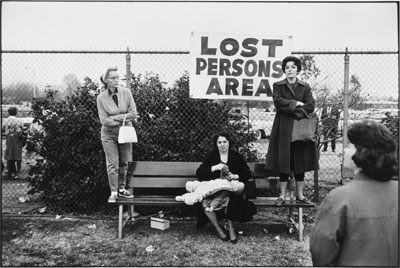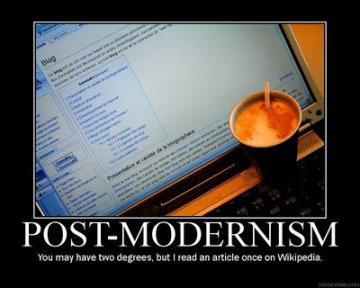Democracy is so 20th century
 John Key: New Zealand’s pre-eminent post-modernist
John Key: New Zealand’s pre-eminent post-modernist
The endless popularity of the Key government represents everything that’s wrong with post-modernism.
John Key is completely unphased by passé modern phenomena like expert opinions and statistics.
Statistics say he’s not fulfilling pledges to catch up to Australia, let alone those 170,000 jobs he promised … but Key is more interested in his own personal subjective experience of “many Australians” wanting him to “go over and be their Prime Minister”. Well shucks, when you put it that way, why are we wasting so much time and money on the drab modern rationality of statistics and research?
Experts highlight the racist undertones of Key’s constituency … but Key, ever the post-modern relativist, chimes in with the inexorable subjectivity of all truths that impact badly on his government: “Racism is subjective.” (Just like poverty is ‘merely relative‘).
Those pesky experts have been at it again this week… Current New Zealander of the Year Dame Anne Salmond joins the Law Society and the Human Rights Commission in raising alarm about the “assault upon the democratic rights of New Zealanders” that is the GCSB bill currently being rushed through Parliament.
Salmond says “When a body as authoritative and dispassionate as the Law Society feels forced to report to the United Nations that the Government in New Zealand is acting in conflict with the rule of law, all New Zealanders should be very worried.”
Don’t they realise that we enlightened post-moderns are skeptical of so-called experts, authority and dispassionateness?
John Key dismissed the Law Society like flies with a simple “I don’t agree.” His personal opinion is worth just as much as theirs!
And, like Paula Bennett before him, he’s given the Human Rights Commission the same treatment. Never mind that they’re worried enough to use their rarely used right to report directly to the Prime Minister. He doesn’t even care enough to note the difference between this report and a select committee submission!
In these post-modern times, the Human Rights Commission are just another bunch of irrelevant experts that can be safely ignored and even de-funded because Key and Co. know NZers won’t get off our couches about it.
I’ve said the popularity of this government represents what’s wrong with post-modernism. But Key’s cynical manipulation of post-modern subjectivity is only part of the problem.
The other side is the apathetic population who swallow this hollow ‘post-political’ ideology because we like his smile, or wish we too could go from Hollyford Ave to multi-millionairehood, or submit to the lazy self-fulfilling prophecy that we can’t change anything … or simply don’t care about anything beyond our personal experience as individual consumers.
As John Key himself said in 2007, “A quiet, obedient, and docile population; a culture of passivity and apathy; a meek acceptance of what politicians say and do – these things are not consistent with democracy.”
Sleepy Kiwis’ casual surrender of democracy is the chilling confirmation of this truism. We are turning Key’s words from a prophetic warning to a Machiavellian political strategy. And we will reap what we sow.


Sheldon Wolin: “Low electoral turnouts are favorably received as an indication that the bulk of the population has given up hope that the government will ever help them.[7]”
http://en.wikipedia.org/wiki/Inverted_totalitarianism
LikeLike
Yip! Specifically in NZ it seems it’s the former Labour voters feeling uninspired in the last few years…
LikeLike
Actually, I don’t think I vote because I hope the government will help, so much as I hope I can use my vote stop them doing so much harm. Neo-liberalism/post-modernity seems to have put to death the hope that the state can be a saviour or a force for justice, but surely it’s also confirmed what socialists & anarchists etc. knew all along: that in capitalist societies, the state is the tool of capitalism and the rich, more than a force against it… So, i think lost hope is only natural, but lying down and letting it happen is still not commendable. We can resist the capital/state alliance in various ways, including voting… so long as we vote for the few people/parties that are trying to use the capital/state alliance against itself.
LikeLike
Haha yes. I dug up that email you sent me way earlier too on a Marxist critique of postmodernism. Just soaking it up at the moment. Hollyford Ave say what?
LikeLike
Yeah, he grew up on Hollyford Ave and went to Aorangi School (which he closed down early in his reign) and Burnside!
LikeLike
I voted for Key, twice. I’m not racist.
LikeLike
That said, I’m not overly proud of that, but the alternative was to hideous to do otherwise.
Democracy is merely a process of counting heads regardless of their content.
LikeLike
“The racist undertones of Key’s constituency” was an unfair generalisation and I apologise. (to be fair though, few of us admit to being racist, but most people in the ethnic majority probably have some ‘racist undertones’ – hopefully minor, and hopefully we can learn/be challenged away from it. Structural racism is less easy to reform)
I like your phrase about democracy. I’m not particularly enamoured by democracy in the sense of a way of choosing political authorities/policies… I chose the title for rhetorical reasons. you can substitute ‘personal freedoms’
LikeLike
Just to note, I have zero intentions of ever doing so again, voting for the Nats I mean. I thought we were going to get, at least to some degree, smaller government and free market reform. Instead we got debt spending, taxes on imports, more regulations, and most egregiously the GCSB bill. Back to protest voting for the Libertarianz.
LikeLike
In Statist societies “Capitalism” is the tool of the State.
The State, at least in it’s current form, is not ANYONE’S friend, including “the rich.”
Now, while prepared to vote for the Nats on the basis that they are the lesser of evils, I’m not exactly enthusiastic about them, and the GCSB bill is wrong, very wrong.
But then so is the Human Rights ACT/Commission, and for exactly the same reason.
LikeLike
On the issue of the claim of “racism” how is “expert” defined? Who qualifies as such and how?
LikeLike
Generally I would say: people who have devoted significant chunks of their life to research and reading about issues surrounding ethnicity, theories and histories of ethnic issues, empirical research around ethnic issues … and are held by general reputation/peer review to have an opinion more worth listening to than most people’s (of course this last criterion is one academic ranking another, so if you’re prone to “one massive academic conspiracy” kind of thinking this won’t be much comfort) (moreover, this definition has quite a ‘pro-academic’ bias, so I’d be open to rephrasing it to emphasise expertise and community standing etc. more than academic stuff).
Any claim to ‘experthood’ can of course be criticised, and no amount of research and respect prevents you from being wrong. And I’m of course open to hearing intelligent critiques of specific things ‘experts’ say. (In fact, criticising other ‘experts’ is one of the main activity of ‘experts’). But, provisionally, I’d rather trust a group of experienced academics than someone with no particular expertise but a definite stake in downplaying what the experts say. And I have absolutely no time for the post-modern, relativist, lazy, nonspecific, usually-self-serving writing off of all ascriptions of superior expertise.
LikeLike
I guess my concern is that I do not believe in academic neutrality. So whenever I hear claims about “experts” my first question is, what are the underlying ideological assumptions behind their work? And this is especially true with those who are working on race, gender, class issues, because, as that trinity of concerns exposes, such “experts” are almost always devotees of the Frankfurt School of Cultural Marxism. Academic neutrality is a myth, and impossible anyway.
LikeLike
I would not write off academia on the basis of post-modernism, but I am inclined to be immediately suspicious of all academics on the basis of the ideological capture of academia by the Frankfurt School.
LikeLike
Fair enough – neutrality is indeed impossible… so i guess the questions become: how do we determine which philosophical perspectives to favour or not favour? From empirical research (itself undertaken/analysed from certain philosophical perspectives) or just how consistent their perspectives are with our own perspectives? (and how do we choose our own perspectives in the first place?). And who from other philosophical perspectives other than dominant ones has intelligent well-researched things to say? And what do these people from these different perspectives looking at the same subject area have in common and where do they differ? And what research/work/analysis from each perspective can be attributed to the philosophical perspectives, and potentially disregarded because of it, and what is likely to be accurate despite the perspectives? Or what is likely to be accurate precisely because of the perspectives – ie someone’s philosophical perspective provokes them to focus on/notice what they might not have focussed on/notice otherwise? All this made even more complex by the fact that (as you acknowledge) the perspective of ‘no perspective’ is itself a perspective, probably an unacknowledged variation of one or more of the most dominant perspectives in the contexts the person’s doing their thinking in…
Anyway … I’m not really in touch with academic trends but I wonder if Foucault is more fashionable these days than the Frankfurt school?
LikeLike
Fair enough. Good on you for copping to that. I’m fairly sure I might be one of the smallest minorities in New Zealand! As yet I have not met any other Native Americans here, let alone any who are Rothbardian Libertarians! 🙂
LikeLike
An apology of my own. Waking up this morning and checking in here I realized that I have made a slew of scatter gun comments all over the place. That was not intentional, but the annoying result of having adult ADD. Sorry.
LikeLike
No need to apologise, I get few comments on this blog and welcome all of them 🙂
LikeLike